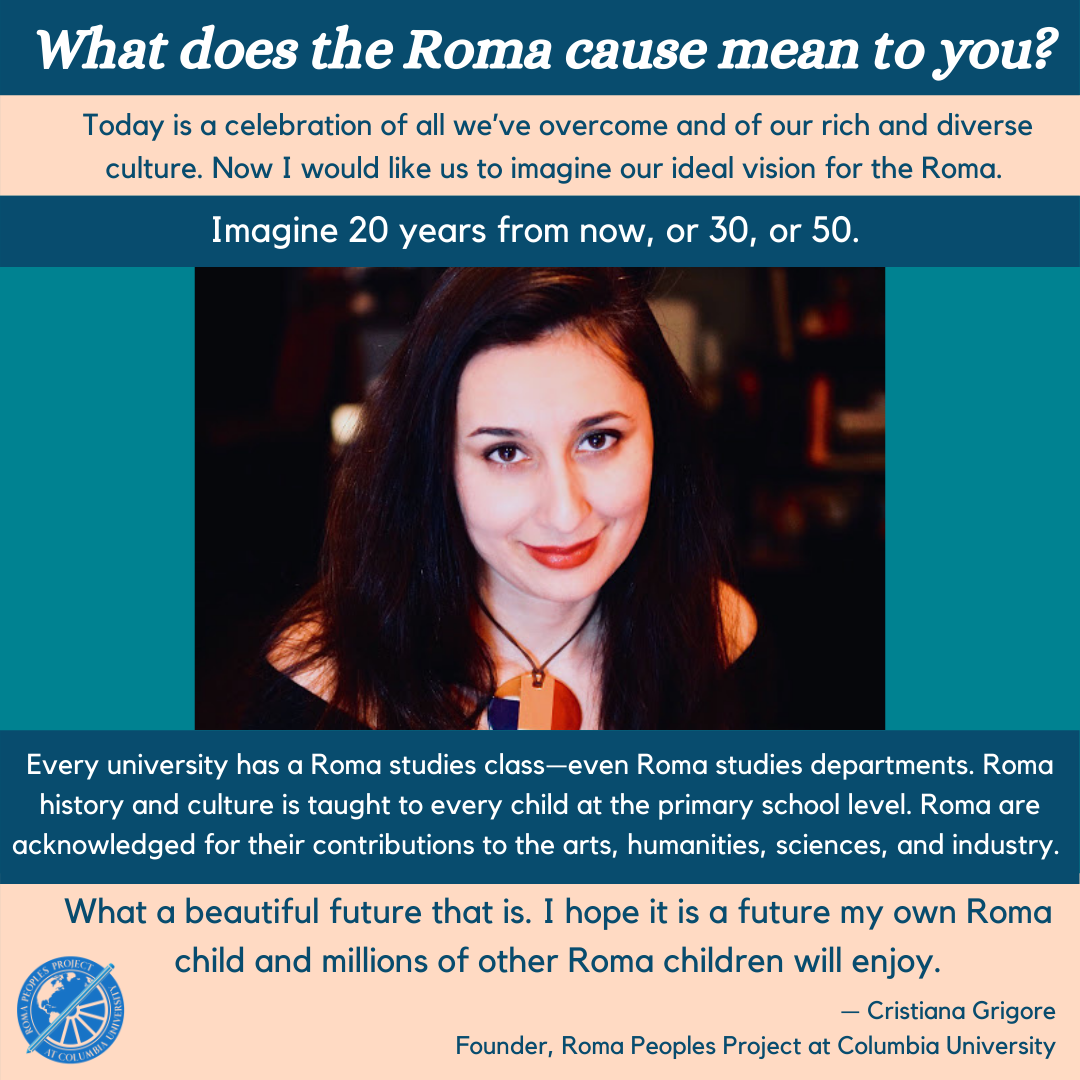International Roma Day 2021: Celebrating a Vibrant, Diverse, Resilient Global People

Roma Peoples Project Founder, Cristiana Grigore, delivered the following speech at the “Conversation About Roma Human Rights in Europe” conference, which took place on April 8th, 2021 at Columbia University.
I am particularly proud that this conference is taking place at Columbia University, my academic home for the past seven years, and where I had the greatest honor of founding the first official initiative focused exclusively on Roma issues approved by Columbia University. I am Roma myself, originally from Romania, and I came to the United States for the first time at the age of 22. It was then that I confronted my secreted Roma identity for the first time, and for the last 15 years I made my life mission to speak about the condition of the invisible Roma and bring visibility to our cause to mainstream institutions.
The mission of the Roma Peoples Project is to create a space at Columbia University for Roma and non-Roma scholars to come together and discuss historical and contemporary issues that affect the Roma. We focus in particular on how to overcome stigma, the need for representation and self-determination for Roma people themselves, and on spotlighting empowering and uplifting stories of Roma people and our allies. Truly, the core of our mission is to be a space for change, recognition and possibilities for Roma people, identity and culture.
Today is a celebration of so much that we’ve overcome and our rich and diverse culture. I would like us to imagine for a minute what our ideal vision for the Roma might look like.
Imagine 20 years from now, perhaps 30, or even 50.
Every university has a Roma studies class—even Roma studies departments. Every university in Europe and many in the US have at least one Roma professor, if not more.
In this future, we as Roma people do not have to explain again and again who we are. We do not have to repeatedly explain that we are not “Gypsies” and that so many stereotypes and myths people have heard about us are not true.
Instead, Roma history and culture is taught to every child at the primary school level to both Roma and non-Roma students. In these classes, images of Roma today living in slums, being evicted from their homes, or brutally attacked, are seen as part of a distant and tragic past.
In this ideal future, Roma are acknowledged for their contributions to the fields of arts, humanities, sciences, and industry. Roma professionals do not feel that they must hide their Roma identity just to be accepted.
The Roma people will embrace who we are as members of a vibrant, diverse and resilient global people.
What a beautiful future that is. I hope it is a future my own Roma child and millions of other Roma children will enjoy.
I believe that is the future we are all working towards today.
There is a lot of work ahead of us, because the Roma today suffer from so many forms of deprivations and exclusions. I’m certain we will hear specific examples from our speakers today, but there are just a couple I wish to mention.
Hannah Arendt spoke about the banality of evil and made the concept popular. I would take that concept further and think for a moment about the banality of exclusion. Of course, there are cases of clear and distinct discrimination and even violence, but in contrast to this more active and violent forms of exclusion, there is a more subtle variety: an exclusion caused by neglect and apathy. This form of exclusion so rarely brings any repercussions for those who practice it. At the same time, the simplest acts can combat it: a bureaucrat directing some discretionary funds to support the Roma, a journalist who takes 15 minutes to fact check, a friend who calls out ignorant remarks.
Even at some of the most inclusive institutions towards Roma, there are still layers of banal exclusion that need to be broken down. I’d like everyone here to take a moment to think of how you might challenge this banality of exclusion, how you can be more active in making institutions inclusive to Roma.
Not everything is doom and gloom. There is progress, and that bright future I talked about is in reach. I want to conclude with a few positive examples: The journalist who wrote a good and informative article about the Roma, and who chose to donate the fee she received towards a Roma cause; The celebrity who once called herself “Gypsy” as a trendy description on her social media, who learned how this misappropriation of the term erases Roma people, and decided not only to stop calling herself “Gypsy” but even became an ally to the Roma cause.
What truly inspires me most to believe in change is the extraordinary community we’ve built over the last four years at the Roma Peoples Project, of over 200 people with about a dozen dedicated volunteers and collaborators.
We welcome each and every person at this conference to get to know us and join our community. We are also very honored for the beautiful message for International Roma Day from our official advisor, Professor Elsa Stamatopolou.
Thank you and best wishes to all of the participants!